| Listing 1 - 10 of 106 | << page >> |
Sort by
|
Periodical
ISSN: 15591131 Publisher: New York ACM
Abstract | Keywords | Export | Availability | Bookmark
 Loading...
Loading...Choose an application
- Reference Manager
- EndNote
- RefWorks (Direct export to RefWorks)
#TS:WBIB --- Periodicals --- World Wide Web --- Web --- World Wide Web.
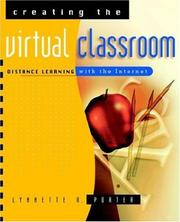
ISBN: 0471178306 Year: 1997 Publisher: New York (N.Y.) Wiley
Abstract | Keywords | Export | Availability | Bookmark
 Loading...
Loading...Choose an application
- Reference Manager
- EndNote
- RefWorks (Direct export to RefWorks)
Computer assisted instruction --- Distance education --- -Internet in education --- -World Wide web --- #eLINK --- W3 (World Wide Web) --- Web (World Wide Web) --- World Wide Web (Information retrieval system) --- WWW (World Wide Web) --- Hypertext systems --- Multimedia systems --- Internet --- Internet (Computer network) in education --- Education --- Distance learning --- Open learning --- Telecommunication in education --- Internet in education --- World Wide Web. --- Lerarenopleiding --- algemeen --- algemeen. --- World Wide Web
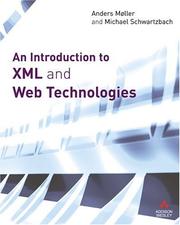
ISBN: 0321269667 9780321269669 Year: 2006 Publisher: Harlow Addison-Wesley
Abstract | Keywords | Export | Availability | Bookmark
 Loading...
Loading...Choose an application
- Reference Manager
- EndNote
- RefWorks (Direct export to RefWorks)
Information systems --- Computer architecture. Operating systems --- XML (Document markup language) --- World Wide Web. --- XML (Langage de balisage) --- Web --- World Wide web --- XML --- informatica --- W3 (World Wide Web) --- Web (World Wide Web) --- World Wide Web (Information retrieval system) --- WWW (World Wide Web) --- Hypertext systems --- Multimedia systems --- Internet --- Extendible Markup Language (Document markup language) --- eXtensible Markup Language (Document markup language) --- Document markup languages --- World Wide Web
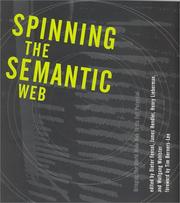
ISBN: 0585444951 0262256134 1423729439 9780262256131 9780585444956 9780262062329 0262062321 9780262562126 026256212X Year: 2003 Publisher: Cambridge, Mass. MIT Press
Abstract | Keywords | Export | Availability | Bookmark
 Loading...
Loading...Choose an application
- Reference Manager
- EndNote
- RefWorks (Direct export to RefWorks)
As the World Wide Web continues to expand, it becomes increasingly difficult for users to obtain information efficiently. Because most search engines read format languages such as HTML or SGML, search results reflect formatting tags more than actual page content, which is expressed in natural language. Spinning the Semantic Web describes an exciting new type of hierarchy and standardization that will replace the current "web of links" with a "web of meaning." Using a flexible set of languages and tools, the Semantic Web will make all available information--display elements, metadata, services, images, and especially content--accessible. The result will be an immense repository of information accessible for a wide range of new applications.This first handbook for the Semantic Web covers, among other topics, software agents that can negotiate and collect information, markup languages that can tag many more types of information in a document, and knowledge systems that enable machines to read Web pages and determine their reliability. The truly interdisciplinary Semantic Web combines aspects of artificial intelligence, markup languages, natural language processing, information retrieval, knowledge representation, intelligent agents, and databases.
World Wide Web. --- Semantic Web. --- W3 (World Wide Web) --- Web (World Wide Web) --- World Wide Web (Information retrieval system) --- WWW (World Wide Web) --- Semantic integration (Computer systems) --- Semantic networks (Information theory) --- World Wide Web --- Microformats --- Hypertext systems --- Multimedia systems --- Internet --- Information systems --- COMPUTER SCIENCE/Human Computer Interaction --- COMPUTER SCIENCE/Artificial Intelligence --- COMPUTER SCIENCE/Computational Linguistics --- 654 --- Informatieverwerking. Bureautica. --- Informatieverwerking. Bureautica
Periodical
ISSN: 19311745 19311435
Abstract | Keywords | Export | Availability | Bookmark
 Loading...
Loading...Choose an application
- Reference Manager
- EndNote
- RefWorks (Direct export to RefWorks)
Hypertext systems --- Interactive multimedia --- World Wide Web --- Hypertexte --- Multimédias interactifs --- Web --- Hypertext systems. --- Interactive multimedia. --- World Wide Web. --- W3 (World Wide Web) --- Web (World Wide Web) --- World Wide Web (Information retrieval system) --- WWW (World Wide Web) --- Multimedia systems --- Internet --- Hypermedia systems --- Interactive media --- Computer software --- Hypertext
Book
ISBN: 902542323X Year: 1997 Publisher: Antwerpen Contact
Abstract | Keywords | Export | Availability | Bookmark
 Loading...
Loading...Choose an application
- Reference Manager
- EndNote
- RefWorks (Direct export to RefWorks)
Internet marketing --- Electronic commerce --- World Wide web (Information retrieval system) --- 681.37 --- 681.35 --- Cybercommerce --- E-business --- E-commerce --- E-tailing --- eBusiness --- eCommerce --- Electronic business --- Internet commerce --- Internet retailing --- Online commerce --- Web retailing --- Online marketing --- Web marketing --- World Wide Web marketing --- W3 (World Wide Web) --- Web (World Wide Web) --- World Wide Web (Information retrieval system) --- WWW (World Wide Web) --- Informatiesystemen --- Computerarchitectuur. Operating systems --- Computer architecture. Operating systems --- Information systems --- Hypertext systems --- Multimedia systems --- Internet --- Commerce --- Information superhighway --- Marketing
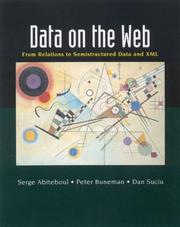
ISBN: 155860622X 9781558606227 Year: 2000 Publisher: San Francisco : Morgan Kaufmann,
Abstract | Keywords | Export | Availability | Bookmark
 Loading...
Loading...Choose an application
- Reference Manager
- EndNote
- RefWorks (Direct export to RefWorks)
Database management --- XML (Document markup language) --- World Wide Web --- World Wide Web (Système d'information) --- World Wide Web. --- World Wide Web (Système d'information) --- Information systems --- Computer architecture. Operating systems --- XML (extensible markup language) --- Bases de données --- XML (Langage de balisage) --- Gestion
Book
ISBN: 9781529764338 1529764327 1529764335 9781529764321 Year: 2024 Publisher: Los Angeles, Calif. Sage
Abstract | Keywords | Export | Availability | Bookmark
 Loading...
Loading...Choose an application
- Reference Manager
- EndNote
- RefWorks (Direct export to RefWorks)
"Teaching the concrete methods needed to use digital devices, search engines and social media platforms to study some of the most urgent social issues of our time, this is the essential guide to the state of the art in researching the natively digital. With explanation of context and techniques and a rich set of case studies, Richard Rogers teaches you how to: Build a URL list to discover internet censorship Transform Google into a research machine to detect source bias Make Twitter API outputs comprehensible and tell stories Research Instagram to locate 'hashtag publics' Extract and fruitfully analyze Facebook posts, images and video And much, much more"--
Internet research --- Internet searching --- World Wide Web --- Social media --- Internet --- Qualitative methods in social research
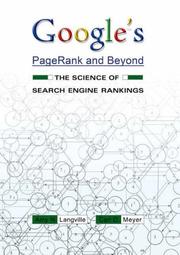
ISBN: 0691122024 9780691122021 9780691152660 0691152667 9781400830329 140083032X Year: 2011 Publisher: Princeton, NJ
Abstract | Keywords | Export | Availability | Bookmark
 Loading...
Loading...Choose an application
- Reference Manager
- EndNote
- RefWorks (Direct export to RefWorks)
Why doesn't your home page appear on the first page of search results, even when you query your own name? How do other Web pages always appear at the top? What creates these powerful rankings? And how? The first book ever about the science of Web page rankings, Google's PageRank and Beyond supplies the answers to these and other questions and more. The book serves two very different audiences: the curious science reader and the technical computational reader. The chapters build in mathematical sophistication, so that the first five are accessible to the general academic reader. While other chapters are much more mathematical in nature, each one contains something for both audiences. For example, the authors include entertaining asides such as how search engines make money and how the Great Firewall of China influences research. The book includes an extensive background chapter designed to help readers learn more about the mathematics of search engines, and it contains several MATLAB codes and links to sample Web data sets. The philosophy throughout is to encourage readers to experiment with the ideas and algorithms in the text. -- Jacket.
Web search engines. --- Web sites --- Internet searching --- World Wide Web --- Ratings --- Mathematics. --- Subject access --- Information systems --- Pages, Web --- Sites, Web --- Web pages --- Websites --- World Wide Web pages --- World Wide Web sites --- WWW pages --- WWW sites --- Computer network resources --- W3 (World Wide Web) --- Web (World Wide Web) --- World Wide Web (Information retrieval system) --- WWW (World Wide Web) --- Hypertext systems --- Multimedia systems --- Internet --- Searching the Internet --- Web searching --- World Wide Web searching --- Electronic information resource searching --- Search engines --- Web portals --- Ratings and rankings --- Google. --- BackRub --- Web search engines --- Internet programming --- Moteurs de recherche sur Internet --- Programmation sur Internet --- 025.04 --- Google --- Mathematics --- Ratings and rankings&delete& --- Subject access&delete& --- IR (information retrieval) --- zoekmachines --- beoordeling --- Informatique --- Computer science --- Computer science. --- Web sites - Ratings - Mathematics. --- Internet searching - Mathematics. --- World Wide Web - Subject access - Mathematics. --- Web sites - Ratings and rankings - Mathematics --- Internet searching - Mathematics --- World Wide Web - Subject access - Mathematics --- Bases de donnees
Periodical
ISSN: 1735188X
Abstract | Keywords | Export | Availability | Bookmark
 Loading...
Loading...Choose an application
- Reference Manager
- EndNote
- RefWorks (Direct export to RefWorks)
"Webology is a scholarly journal in English devoted to the various fields of Library and Information Science and serves as a forum for discussion and experimentation. It serves as a forum for new research in information dissemination and communication processes in general, and in the context of the World Wide Web in particular. Concerns include the production, gathering, recording, processing, storing, representing, sharing, transmitting, retrieving, distribution, and dissemination of information, as well as its social and cultural impacts."
World Wide Web --- Information science --- Library science --- Information science. --- Library science. --- World Wide Web. --- Information Technology --- Library and Information Sciences --- Internet --- Librarianship and Libraries --- information science --- library science --- internet studies --- Library science --- Information retrieval
| Listing 1 - 10 of 106 | << page >> |
Sort by
|

 Search
Search Feedback
Feedback About UniCat
About UniCat  Help
Help News
News